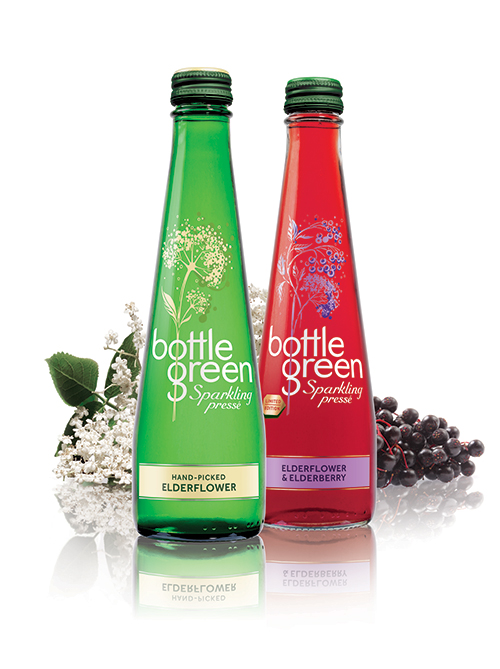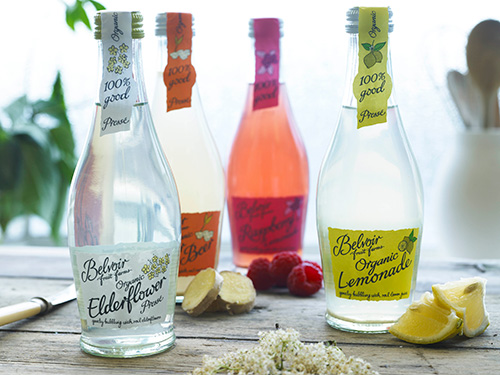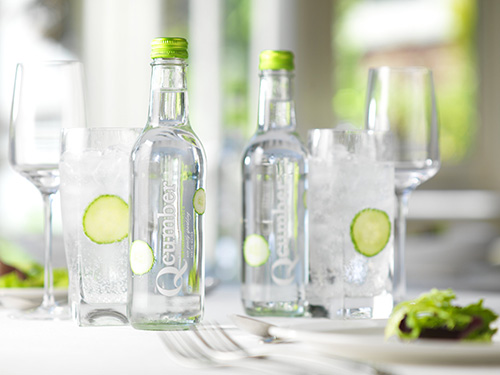Top of the pops: the new wave of soft drinks
A new wave of soft drink companies is challenging the hegemony of Coke and Schweppes behind the bar. Will Hawkes finds out more
It's just after 10am on a sunny winter morning and Square Root's premises in Hackney is buzzing with activity. Crates of oranges and lemons are being delivered by the entrance, while inside, two of the company's nine staff are bottling the previous day's batch of ginger beer. Co-owner Ed Taylor, 27, looks concerned. "Some of the blood oranges have been damaged," he says, gesturing out through the open shutter doors. "It looks like a fork-lift truck has poked through one of the palettes." Will they be OK? "Should be."
"We set up Square Root as a response to all the really sugary soft drinks out there," says Robyn Simms, 25, Taylor's partner. "[For] A lot of people who don't drink, the situation is not great, really; you go to the pub and it's 70 grams of sugar if you drink two. We wanted to create something that is more interesting, and lower in sugar."
Flower power
Square Root's commitment to making as natural a product as possible - they use whole fruit rather than juice, for example - reflects the way the market is moving. It's not a new concept but it appears to be picking up pace: Bottlegreen, an elderflower cordial first launched onto the market in 1989, is enjoying record sales according to Amanda Grabham, marketing director at Bottlegreen's owners SHS Drinks: "When something has been around for a while, you expect the growth to come from elsewhere. But genuinely our biggest growth still comes from Bottlegreen elderflower," she says. "It's the epitome of a sophisticated adult drink, and it's great with a gin and tonic. Bottlegreen's natural credentials are fundamental to its success; when we talk to consumers, [to them] natural means trust and quality. It's absolutely trusted; it's made in the heart of the Cotswolds using a really good process and simple, natural ingredients."
It's fairly standard these days for brands to trumpet their natural credentials - take Qcumber, which is sold as 'a refreshing blend of natural cucumber and gently sparkling spring water.' It's what the public expects. "Consumers are certainly looking closely at the ingredients and calorie content of food and drink," says creator Graham Carr-Smith. "People are looking for 'natural' products and are wary of the word 'artificial' when it comes to drinks."
Some natural options, like coconut water and pomegranate, are growing in popularity year on year. Marja Lawrence, operations manager at Funnybones Foodservice, which produces the Grace range of drinks, says the natural qualities of these ingredients are crucial. "Coconut water contains virtually no fat and it's low in calories, so it helps to aid hydration and quench thirst," she says.
"Likewise, Aloe Refresh is growing in popularity and boasts benefits such as aiding digestion and boosting the immune system, is fat free and gluten free. It is no surprise that drinks such as these are leading the way."
An interesting twist is the way in which pubs and bars are driving the natural trend. With the best pubs in most of the UK's major cities now offering a wide range of beers and spirits, it seems only a matter of time before there is an equally diverse offering of soft drinks and mixers.
"Pubs were originally our main target," says Simms. "Ed worked at [the microbrewery] Howling Hops [at the Cock Tavern in Hackney] and I worked at the Euston Tap, and we could see that everything that was on offer didn't really fit with the ethos of these places - they had local beer, made properly, but still had Coca-Cola. That's changing now."
Not only that, but cocktails are increasingly made with more natural options, from Bermondsey Tonic Water to Bottlegreen's cordial range. "We've seen significant growth," says Graham. "They're a great cocktail ingredient."
Beyond the booze
But while customers expect higher-quality cocktail ingredients, others are turning their back on booze entirely. It's a trend driven by younger people, with more than one in five teetotal, according to figures from the Office for National Statistics. It's a switch that plays into the hands of the new soft-drinks producers, with customers looking for something a bit sexier and healthier than coke or lemonade.
"People are choosing not to drink alcohol because they are driving, or as a health decision," says Lawrence Moore, sales director at Belvoir Fruit Farms. "Family visits mean that children must be catered for too, but their drinks range is very different to an adult drinks range; it's vital that these non-alcohol drinkers are given an appropriate choice of soft drinks. Operators should give soft drinks exactly the same attention as beers, wines and spirits."
There's increasing variety now, although outlets tend to offer only one brand, as Simms point out. Demand will mean that changes. Even drinks that do not seem super-healthy are likely to benefit as customers move away from alcohol - such as Dominion's range of sodas, made in the USA with natural ingredients.
Thomas Kiss, operations director at the Chicago Rib Shack, which serves Dominion's Root Beer, says: "It's very popular because it's exciting and different: it's a good alternative to other soft drinks - I think because it is made with cane sugar and pure honey, it appeals to families with children, non-drinkers and drivers. We also use it in floats and sundaes and these are very popular too."
There are also more soft drinks now being made with vegetables and other lower-sugar ingredients such as cucumber, spinach, carrot, rosehip, goji berries and pomegranate. These ingredients are becoming ever more diverse - take birch sap, which is the base ingredient for Buddha Water drinks.
"Drinkers are trying to choose the healthier route," says Catherine Mulcahy, chief executive of Yourtonic, the UK distributor of Buddha Water. "This is translating into them choosing drinks or mixers that use less sugar, or choosing sugar alternatives that are derived from more natural sources; for example, xylitol comes from birch sap, which is a better alternative than sucrose or fructose.
"Customers still want to treat themselves, but this doesn't mean they have to compromise on taste, so there's a growing trend away from conventional fizzy drinks to more sophisticated options, like fruit tonic mocktails or vegetable-based drinks."
Boutique and unique
The common denominator for all these drinks is that they're produced on a small-scale - or, at least, they appear to the customer to have been. Since Square Root got started in 2012, they've seen a number of rivals emerge, although not all of them take quite the same path. "The main difference is they look at us and say 'That looks like a lot of work' so they go to the bottling companies and get them to do it!" says Simms.
Customers believe that smaller companies are more ethical or honest, says Mulcahy. "We are definitely seeing a preference for smaller, premium brands with provenance," she says. "Small is beautiful again and nowhere is this more evident than the massive explosion of craft beers, niche mixers and boutique botanical-based drinks. Artisan is back in favour - people are seeking out products that have provenance, craft and, most of all, taste great."
Bigger brands like Schweppes are also getting in on the game with drinks like their sparkling grapefruit and blood orange juice. It's a sensible move given how successful Square Root has been by sticking to its principles.
"We're always going to do it how we do it now," says Simms. "I wouldn't want to use juice rather than real fruit; I want control over the whole process. We might need new premises; we're using every inch we have available, and finding somewhere bigger in East London is a challenge. I think for now we'll find a warehouse to store stock - but I don't want to sell out.
"It's like when someone asked Randolph Hodgson, the founder of Neal's Yard Dairy, if he'd like to sell and go and do what he wanted - he said he was already doing it. That's our view too."
Continue reading
You need to be a premium member to view this. Subscribe from just 99p per week.
Already subscribed? Log In















